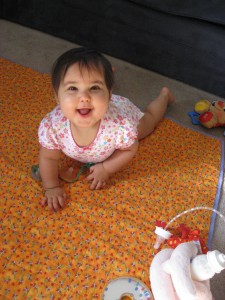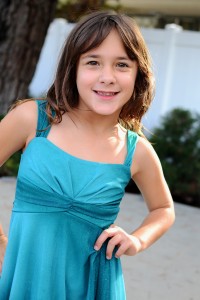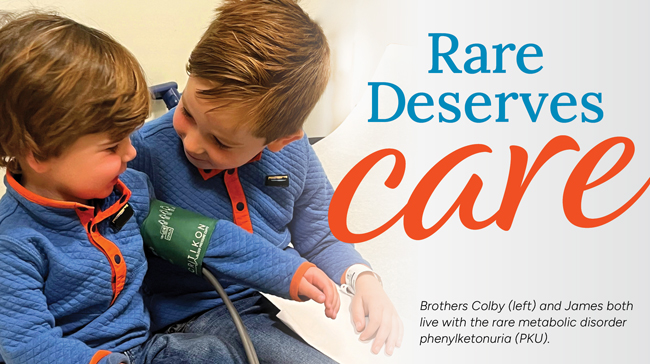Laurie and Chuck Eallonardo were thrilled at the birth of their twins, Jenna and Caden. Laurie felt happy and relieved that she had been able to carry them for 38 weeks, almost to full term, which can be harder with twins.

“One afternoon, during a normal feeding time with 5-month-old Jenna, she suddenly shrugged her shoulders and rolled her eyes up. It wasn’t a big jolt, and could have easily been overlooked, but my gut told me something wasn’t right,” said Laurie.
Over time, Jenna’s erratic movements occurred more often. She began having episodes of bending forward and clenching her body repeatedly. Jenna would cry inconsolably for hours at a time and nothing her parents tried seemed to help. After several weeks, she completely stopped playing and lost her smile and ability to laugh.
“We were desperate to figure out what was wrong. Finally, an EEG confirmed she was having seizures. We had no idea at that time that using typical seizure medicines would have no effect on Jenna. We also did not realize how neurologically devastating her type of seizures could be,” said Laurie and Chuck.
After months wasted on an ineffective treatment, the Children’s Hospital of Los Angeles doctors diagnosed her with Infantile Spasms. Infantile Spasms are a catastrophic age-specific epilepsy syndrome that has its onset within the first 12 months of life, with most cases appearing between 3 and 7 months of age. Jenna had more than 100 seizures per day. This number is common with the condition, according to NORD’s Physician Guide to Infantile Spams, written with Cristina Y. Go, MD, and O. Carter Snead III, MD, FAAN. Jenna’s parents remember being horrified when they learned this, and that some of Jenna’s leg twitches, which had seemed like normal behavior for a newborn baby, were actually part of her seizures.
Because of the constant seizures that may be impossible to stop, most children with this disorder often have poor development and intellectual disability.
After receiving the diagnosis, Jenna got the only approved treatment available at the time, adrenocorticotropic hormone (ACTH). The cost was partly covered by NORD through its Patient Assistance Programs. “NORD got the ACTH medication to us immediately while our medical group needed more time to authorize and figure it out. We didn’t have an extra minute to waste,” Laurie said.
“We knew within five days it worked,” Laurie recalls. The seizures stopped and Jenna had her first smile since they had begun.
ACTH creates high dose steroids in the body and acts as an immune modulator. Jenna experienced many of the side effects in order to stop the devastating seizures including high blood pressure, sleep disruption, increased appetite and severe irritability.
“The ACTH treatments were ultimately a miracle cure for Jenna. After four long months of severe and frequent seizures, Jenna became seizure free [and] to this day our family celebrates the anniversary of Jenna’s ‘Happy Day’,” said Laurie.
Laurie and Chuck made a donation to NORD, a 501(c)(3) charity, as a thank you. Laurie and her family are very grateful to NORD for providing medication to them, total strangers.
“Your organization helped save our daughter’s life when she was a baby. Jenna had severe Infantile Spasms (catastrophic seizures) for four months. NORD paid for the ACTH medication – the injections stopped her seizures.”
Laurie wants others to know that that timely intervention is so important: “I worked as an Occupational Therapist and I had never heard of Infantile Spasms. If parents don’t know to get help immediately, their child’s quality of life and development will quickly diminish,” she added.
Continuing, Laurie said, “We can’t thank you enough and we are enthusiastic about sharing her miraculous story. You may be interested to know that Jenna is also extremely unique with some genetic findings. She has a partial duplication on a couple chromosomes and may be the only one in the database to have both those duplications. The amazing thing is she does not present like the other few examples we have. She is such a mystery and quite a determined, enthusiastic girl.”
“Jenna’s story [is] really is beyond belief. I want the staff, volunteers, and supporters of NORD to know how critical and life-altering your organization is,” she said.
Following treatment, the family started intensive early intervention services, and it took more than a year for her to gain some basic social, motor and language skills.
She first spoke at the age of 2 ½ and with years of medication and therapy, she has overcome massive delays. She is now an outgoing student who shines, has starred in her school play, and loves to dance, sing, and play with friends.
Her neurologist, Dr. Pantea Sharifi Hannauer (UCLA & Pediatric Minds Early Childhood Treatment Center, or ECTC, in Torrance, Calif.) has said that she has never seen an infantile spasms patient turn out this well.
Her parents say, ““We will never take for granted her abilities, relationships and joy in life!”
“She’s ahead in spelling and reading,” beams Laurie. “I’m in tears when I see her play or speak.”
Laurie invites families to contact her at 310-213-8298 and [email protected].
If you are interested in making a gift to NORD or in honor of a loved one, please visit our Ways to Donate page or contact Ahleum Morris, [email protected].







